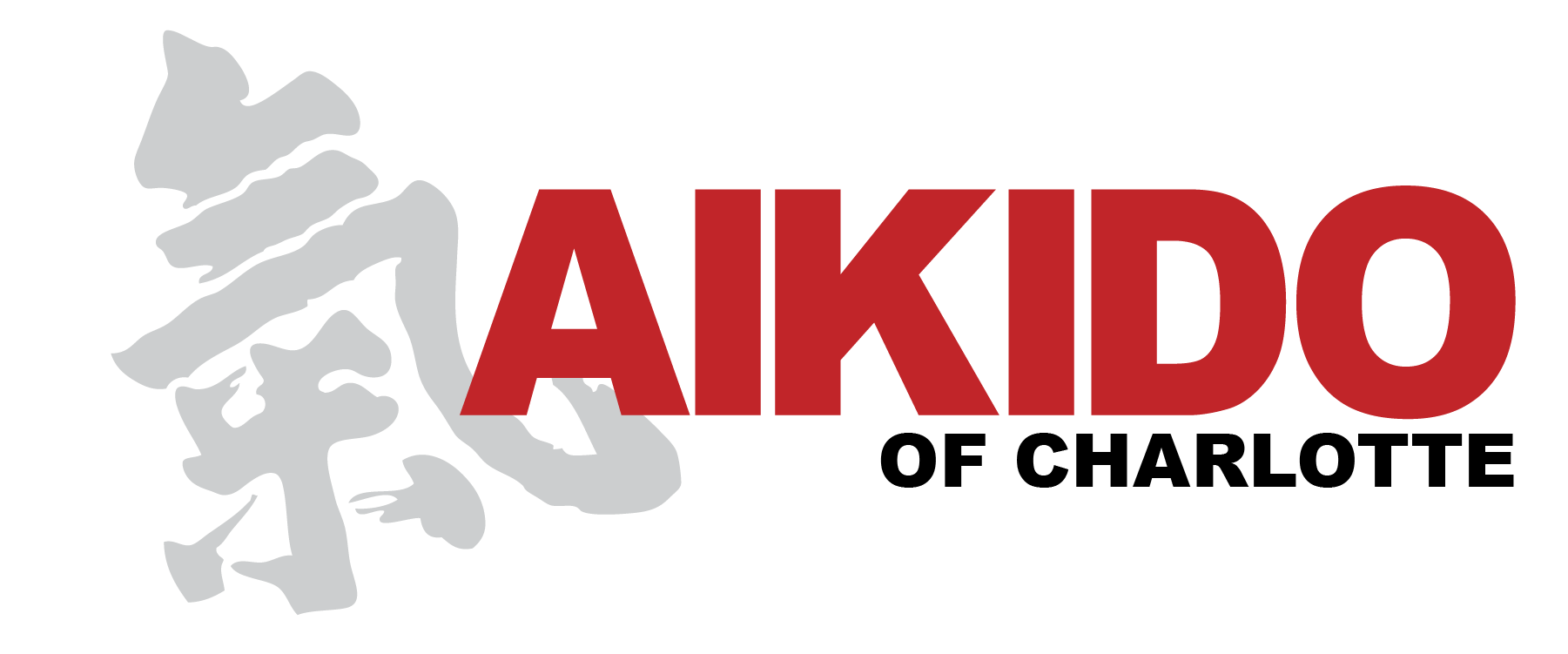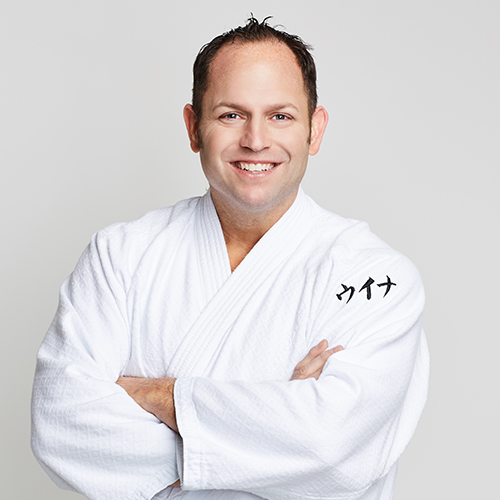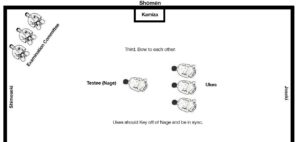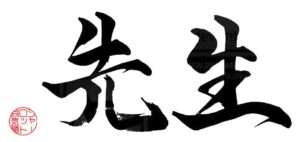5 Questions with our Chief Instructor – Part 2
Jared Heintz: Aikido is often praised for its applicability in self-defense situations. Could you discuss how Aikido techniques can be adapted to real-world scenarios, and what mindset one should cultivate in such situations?
Weiner Sensei: As I approach 25 years of Aikido practice, I’ve realized that Aikido techniques can be non-physical as much as physical. Meaning, it starts with your mindset. What is your intention in how you live your life? Your approach to conflict. And from a self defense standpoint, are you in a reactive state or proactive state. Dedicated aikido practice should elevate all of these. It should give you a path to resolution with minimal conflict. Now I realize that’s easier said than done. Today versus 20 or 50 years ago, you have to be more vigilant than ever to be prepared to defend yourself should someone escalate the force or even attempt to use deadly force. Aikido & the defense tactics training I’ve done and do with Law Enforcement has certainly raised my level of situational awareness over the years. To some degree, I think there’s some truth to the ones who go looking for trouble aren’t much of a problem for those ready for them. As far as the physical techniques go, if you think Aikido is about fighting, you’re already defeated. Especially physically. Aikido is a survival art, not a ritual fight. And most MMA practitioners will never understand the difference. In Aikido, we always want to avoid fighting. But if we need to, the root techniques come from the battlefield. That is an important historical fact about the founder’s influences in Daitō-ryū Aiki-jūjutsu,Tenjin Shinyo-ryu & especially Yagyū Shingan-ryū. So what we practice in the dojo is an abbreviated, slower, safer version of the root techniques so we don’t damage or hurt our partners. In a street situation, where you have to defend your life. It is much different. The power & force of Aikido can be very devastating especially to someone that doesn’t know how to receive it.
Jared Heintz: How does Aikido training benefit practitioners beyond physical fitness, such as in terms of mental discipline, stress management, or personal growth?
Weiner Sensei: Aikido is very much about Kokyu, or breath. Learning to breathe properly can reduce stress, lower your heart rate, improve circulation, destress & more. One of the hardest things to learn is how to control your breathing in an adrenal stress situation. That is why we focus a lot on that in practice. Sometimes it’s just brief zazen (meditation), other times, it’s incorporating exercises to teach you to move from your center, using breath power versus muscle or brute force. But the complete cycle of Kokyu-ho (breathing exercises) has so many benefits to training and in daily life. So if you are trying to calm yourself from work stress, life stress or more. Aikido is a wonderful outlet to do so.
Jared Heintz: In your experience, what are the most common misconceptions people have about Aikido, and how do you address them?
Weiner Sensei: That Aikido doesn’t work. It looks fake. Because it’s a martial art, like Karate, Judo, Tae Kwon Do or BJJ, it’s often compared. But that would be like comparing competitive archery to deer hunting with a bow. Both are archery, but two different intentions. One is a sport trying to score points on a target, the other is trying to provide a food source. For example, the intention of Aikido training versus BJJ training (Sport) is quite different. There are too many to name, but to my point above, Aikido is a survival art in the core sense where BJJ is a ritual fight. Ritual fight meaning, ready, set, go. Rules. Points. Trophies. Etc. As you know, there is no competition in Aikido. No sport. No trophies. Etc. And to be honest, I typically don’t address them unless it’s coming from a potential student who is sincere about starting Aikido training. Too many social media keyboard warriors 🙂
Jared Heintz: What originally drew you to Aikido, and how has your journey in practicing it unfolded over time?
Weiner Sensei: I’ve always been interested in martial arts from an early age. Studied some Karate before finding Aikido in 1996. But when I saw Aikido, even though I didn’t know what it was then, I knew I wanted to do it for the rest of my life. It has given me so much. Amazing mentors. Students. Friends. I’ve been able to train in a lot of dojos over the years, different aikido organizations including other countries. In addition to my own development, my journey has been extremely rewarding because of the opportunities I’ve created to pay it forward. Teaching is certainly in my DNA. And I truly love it. The feeling of seeing a student progress, week to week, month to month & year to year is truly empowering. Nothing pleases me more than seeing a student reach Shodan. Because it shows that not only did they learn the basics but they developed as a person & reached a level that 98% of all people that start a martial art never reach. As a teacher, the feeling I get is that I created an environment of hard work, dedication, commitment and loyalty. And those are great feelings.
Jared Heintz: As a beginner, what should I focus on to make the most of my Aikido training, both inside and outside the dojo?
Weiner Sensei: Great question, the most important part is to be consistent in making classes. Progress happens from learning at the dojo with qualified instructors and training partners. While everyone learns at different paces and in some different ways, Visual, Auditory & Kinesthetic, Aikido practice is a mutual exchange between two people. Even though working on tae sabaki by yourself is helpful, or practicing a weapons kata by yourself is recommended, training with a partner is the best & most important type of practice for beginners and experienced aikidoka. Having said that, as a beginner, I recommend focusing on your footwork, lowering your center, really digging into uke’s role from the attack & finally learning to meet the mat safely. Lots of ukemi practice. Your mindset should be to become a better ‘uke’ than a ‘nage’. Receiving the technique more will allow you to understand how to perform the technique as well as how it works.
Rank Testing Bowing Reiho – Advanced
Rank Testing Bowing Reiho – Advanced Andy Demko Shihan likes to say, “The little things don’t mean a lot, they mean everything”. Everyone who has practiced in our dojo or visited has seen that we take Reiho (Etiquette) pretty seriously. In all that we do, practice. Bowing. Addressing each other & more. I learned a…
Sensei
Sensei 先生 The two characters that make up the term can be directly translated as “born before,” and imply one who teaches based on wisdom gained from age and experience. In general usage, it is used, with proper form, after a person’s name and means “teacher.” In Japan, the word is also used as a…
5 Questions with our Chief Instructor – Part 1
5 Questions with our Chief Instructor Jack Freund: Why is attending seminars so valuable? Weiner Sensei: Seminars are valuable because so many things can take place in that style of training. Whether the seminar is one day or an entire weekend, it is an opportunity for all your focus to be on Aikido training. It…




